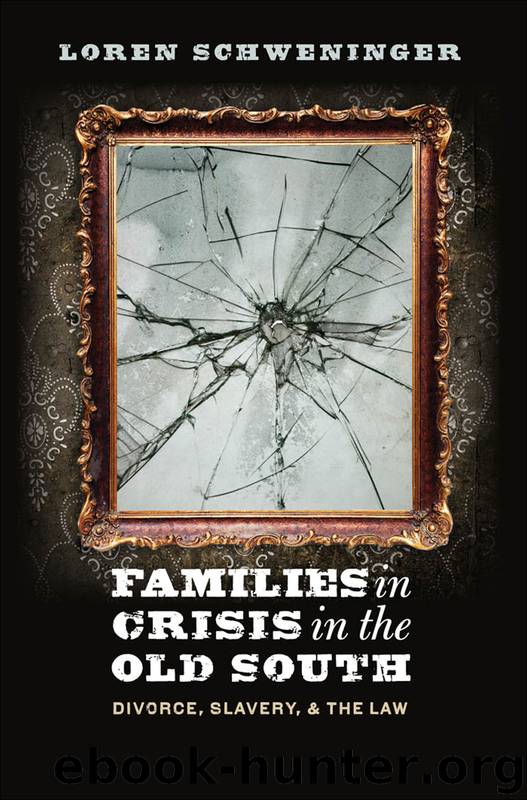Families in Crisis in the Old South by Loren Schweninger

Author:Loren Schweninger
Language: eng
Format: epub
Publisher: The University of North Carolina Press
Published: 2012-01-19T16:00:00+00:00
AN ESSAY ON SOURCES AND METHODOLOGY
Several factors recommend antebellum equity, or chancery, court records as a remarkable source for understanding divorce, slavery, and the law in the Old South. First, most contemporary sources—diaries, correspondence, notebooks, tracts, autobiographies, reminiscences, newspaper accounts, and magazine articles—rarely discuss failed marriages and almost completely ignore the bitterness, anger, frustration, infidelity, and violence of some domestic relationships. Perhaps the best example of this is the famous 1,380-page diary written by Ella Gertrude Clanton Thomas, the wife of a Georgia planter. Spanning more than four decades, beginning in 1848, Gertrude Thomas admitted that she never wrote about her “inmost thoughts,” even though the temptation to write about the feelings that agitated her heart were “almost irresistible.” Consequently, she and many other members of slaveholding families kept their deepest and darkest secrets hidden. In Thomas’s case, she never divulged, except circuitously, that both her father and her husband had “outside wives and children” or that her husband became an alcoholic. Nor did she or others discuss domestic violence or the sexual abuse of slaves and children committed by neighbors and friends. Thus, what grieved Gertrude the most went unsaid and unrecorded.
Many other southerners who kept journals and diaries were equally silent on such subjects, especially white women who omitted the most wrenching and revealing as well as emotionally significant events in their lives. They did so in accordance with the mores and the cultural values of the time. As historian Nell Irvin Painter observed, southern elites were adept at keeping secrets and preserving appearances. Not until private pain or public shame had reached the breaking point and the legal steps required to dissolve a marriage and break up a family had been taken were reticence overcome and decorum set aside, laying bare what had been carefully concealed or silenced in many families.1
Second, the equity, or chancery, court divorce and alimony records from the antebellum years are far more complete than those that came before or after, in terms of length, complexity, detail, family history, court record, and testimony. The records offer a rich assortment of related documents, including amended petitions, oaths, affidavits, court orders, depositions, court testimony, interrogatories, defendants’ answers, decrees, and judges’ opinions. Prior to the American Revolution, only a few states even permitted divorce, and witness testimony offered in cases of separation of property was sketchy at best and in most cases nonexistent. After the Civil War, divorce petitions became extremely brief; they were filed primarily by men, whereas those filed before the war were filed primarily by women, and the men’s cases often lacked witness testimony. The postwar cases, as one authority writes, “took on a purely legalistic mode of argument,” and the narrative form of the antebellum era was replaced with a “formulaic outline.”2
The divorce records of the antebellum era provide a wealth of material about failing domestic relationships and offer unique insights into the lives of all the household members, including slaves. Offering a sharp contrast to the usual reserve found in private
Download
This site does not store any files on its server. We only index and link to content provided by other sites. Please contact the content providers to delete copyright contents if any and email us, we'll remove relevant links or contents immediately.
| Anthropology | Archaeology |
| Philosophy | Politics & Government |
| Social Sciences | Sociology |
| Women's Studies |
Cecilia; Or, Memoirs of an Heiress — Volume 1 by Fanny Burney(32548)
Cecilia; Or, Memoirs of an Heiress — Volume 2 by Fanny Burney(31947)
Cecilia; Or, Memoirs of an Heiress — Volume 3 by Fanny Burney(31932)
The Great Music City by Andrea Baker(31917)
We're Going to Need More Wine by Gabrielle Union(19034)
All the Missing Girls by Megan Miranda(15958)
Pimp by Iceberg Slim(14488)
Bombshells: Glamour Girls of a Lifetime by Sullivan Steve(14057)
For the Love of Europe by Rick Steves(13914)
Norse Mythology by Gaiman Neil(13349)
Talking to Strangers by Malcolm Gladwell(13349)
Fifty Shades Freed by E L James(13233)
Mindhunter: Inside the FBI's Elite Serial Crime Unit by John E. Douglas & Mark Olshaker(9324)
Crazy Rich Asians by Kevin Kwan(9279)
The Lost Art of Listening by Michael P. Nichols(7494)
Enlightenment Now: The Case for Reason, Science, Humanism, and Progress by Steven Pinker(7306)
The Four Agreements by Don Miguel Ruiz(6745)
Bad Blood by John Carreyrou(6611)
Weapons of Math Destruction by Cathy O'Neil(6265)
